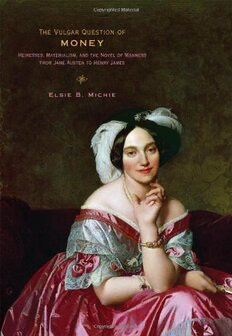
The Vulgar Question of Money: Heiresses, Materialism, and the Novel of Manners from Jane Austen to Henry James PDF
Preview The Vulgar Question of Money: Heiresses, Materialism, and the Novel of Manners from Jane Austen to Henry James
the vulgar question of money This page intentionally left blank © 2011 The Johns Hopkins University Press All rights reserved. Published 2011 Printed in the United States of America on acid-free paper 9 8 7 6 5 4 3 2 1 The Johns Hopkins University Press 2715 North Charles Street Baltimore, Maryland 21218-4363 www.press.jhu.edu Library of Congress Cataloging-in-Publication Data Michie, Elsie B. (Elsie Browning), 1948– The vulgar question of money : heiresses, materialism, and the novel of manners from Jane Austen to Henry James / Elsie B. Michie. p. cm. Includes bibliographical references and index. isbn-13: 978-1-4214-0186-7 (hardcover : alk. paper) isbn-10: 1-4214-0186-x (hardcover : alk. paper) 1 . English fiction—19th century—History and criticism. 2. Material culture in literature. 3. Money in literature. 4. Material culture—Great Britain—History—19th century. 5. Great Britain—Social life and customs—19th century. I. Title. pr878.m38m53 2011 823.8093553—dc22 2010050251 A catalog record for this book is available from the British Library. Special discounts are available for bulk purchases of this book. For more information, please contact Special Sales at 410-516-6936 or specialsales@ press.jhu.edu. The Johns Hopkins University Press uses environmentally friendly book materials, including recycled text paper that is composed of at least 30 per- cent post-consumer waste, whenever possible. For Emily, Sarah, and Molly, who grew up while this book was being written This page intentionally left blank contents Preface: Vulgarity, Wealth, and Gender ix Acknowledgments xv Introduction Rich Woman / Poor Woman: An Anthropology of the Nineteenth-Century Marriage Plot 1 1 Social Distinction in Jane Austen 26 2 Frances Trollope and the Problem of Appetite 65 3 Anthony Trollope’s “Subtle Materialism” 103 4 Margaret Oliphant and the Professional Ideal 142 5 Henry James and the End(s) of the Marriage Plot 179 Afterword From Pemberley to Manderley 216 Notes 223 Bibliography 277 Index 293 This page intentionally left blank preface Vulgarity, Wealth, and Gender When I began working on this book it had become the fashion to introduce aca- demic papers by telling personal anecdotes—a custom initiated, I think, by the epilogue to Renaissance Self-Fashioning, in which Stephen Greenblatt tells the story of sitting next to a man on a plane who is going to visit his hospitalized son who has lost the ability to speak and the will to live. I used to begin the papers that even- tually formed this book by explaining that I became interested in the rich woman in the nineteenth-century novel after my mother died and left me money she had inherited from her mother and kept in her own name even after she was married. Jokingly, I called that money my matrimony since I was unmarried and it was, in eVect, my patrimony. But telling the story of my inheritance did not work as such anecdotes were sup- posed to do. It did not elicit sympathy or engage the audience’s attention. Instead, as I spoke, listeners’ eyes stopped meeting mine. My audience became restless and began to cough and shuZe. They looked down at their feet and seemed to be overcome by what Christopher Herbert has called “a panicky dread of indelicate references to money matters” (“Filthy” 199). It was as if they were literally feeling what we call the embarrassment of riches. One should speak of money in the re- fined, almost inaudible tones associated with the quiet of banks with their marble halls or of investment oYces with their deep carpets. One should reveal it only indirectly as in the haute couture clothes that are so understated that only the co- gnoscenti know how much they cost. When I talked about my inheritance, I was, like the fashions typically chosen by the nouveau riche and the heiresses I write about here, being too loud, too explicit about the possession of wealth. The term the Victorians would have used to describe my behavior was “vulgar,” a word that carried such aVective force in the period that the narrator of Anthony Trollope’s The Prime Minister (1876) can exclaim, “Vulgarity! There was no other word in the language so hard to bear as that” (177). For us in the late modern era vulgarity is more commonly associated with
